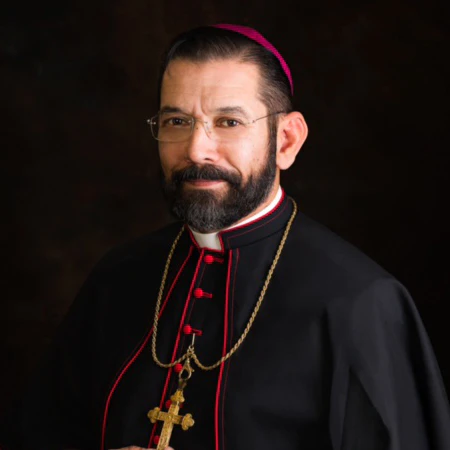Bishop Daniel Flores of Brownsville, Texas, is chairman of the U.S. bishops’ committee on doctrine, and is frequently hailed as a leading intellectual among the U.S. Catholic episcopate.
After a May 24 school shooting in Uvalde, Texas, killed 21 people, most of them children, a national conversation on guns began, as it often has after the mass shootings that punctuate American life.
Flores attracted attention among Catholics when he weighed in May 25, with a tweet lamenting that Americans “sacralize death’s instruments, and then are surprised that death uses them.”
Bishop Flores talked with The Pillar Wednesday about guns, human conversation, and the theological foundations of the U.S. bishops’ approach to gun control legislation.
Bishop, I think most people are aware that the bishops’ conference has a long history of advocating for specific gun control measures at the federal level, and that bishops have done the same at the state level.
But less often discussed is the theological foundation for that advocacy. What is the beginning of a theological approach to questions about guns and society?
That’s a good perspective to spend time on, because this conversation gets reduced very quickly to a political sense - to one party’s views as opposed to another. And, at least for us, I think we have to look with a wider lens.
It’s true that the [bishops’] conference has spoken about different policies, and advocated for various kinds of reforms in terms of gun control.
But the larger framework, theologically, is the Church’s expectation that civil society must seek after the common good - and that means protecting the vulnerable and exercising a reasonable prudence with regard to the order of things. And that's a responsibility not primarily of the Church, but for the human good that any society would have no matter what political system it happens to operate under.
There is a moral dimension to how we organize ourselves, for the sake of, for example, the good of children, the good of the elderly, the good of the sick, and so on, there are certain laws that need to be constructed in a way that promote the best possible stewardship of human life, and of a peaceable community, so that everyone can live in peace in their local communities and in their countries. That’s a basic moral good.
You go back to something like Mater et magistra and even to Pius XII talking about the responsibilities of civil society.
And again, this is not the Church saying, “Okay, this is how you need to organize things.”
But instead, given their particular circumstances, it's the responsibility of the political order and the social order to deliberate and to take seriously the responsibility for the ordering of things, for the good of the whole. So that's a moral responsibility.
And, you know, the question of guns becomes a part of that. Indeed, with any kind of weaponry — there is a legitimate right of the state to exercise a vigilant and reasonable stewardship and control over the access to weapons or things which could potentially cause great damage to the good of the whole.
And that’s a basic stance, especially in modern society, it’s an important one, because it delineates the Church’s expectation of forming her own people to be active and participatory in the political process that comes to a kind of consensus as to how we order things in a way that protects our children, protects our elderly protects, protects people who are vulnerable, especially when it comes to the potential of violence. So that's the basic moral framework
And then we can look at each locality: each country, and state, and city, or region, and so forth, in terms of how that plays itself out. It’s not just one size fits all necessarily. The circumstances here in this country are different than they are necessarily in another country, so we, of course, have to be most concerned about how we order things here, and that's the issue in our frame of responsibility.
But there is a responsibility to govern these things and to order them.
As we think about that moral responsibility, you tweeted Wednesday morning about “sacralizing death’s instruments,” which is a very powerful phrase. Can you talk more about that?
Well, I was referring to the fact that the discourse we’ve had now for decades, about any attempt to control weapons that can cause grave damage — some of which moves have been enacted into law and others which have been resisted — is countered with a description that [gun ownership] is basically an individual’s sacred right, that no matter what the cost, it must be preserved.

And when I say “sacralized,” I mean that we make it seem almost as if it detracts from human dignity, or the human good, simply to say that we need to have some reasonable limit on these things. To say something is sacralized is to say it’s almost taken out of any possibility for conversation.
It is a strong statement, but we do sometimes speak about things that way, and I must say that in some sense, we have kind of sacralized the whole idea of the individual right, such that it trumps any communal concern. It becomes an untouchable aspect in the discourse, that the common concern for the good of the vulnerable is not in any way sufficient to limit the individual right to determine whether or not I want to own this kind of a gun, or that kind of gun, or, you know, a hand grenade for that matter.

No comments:
Post a Comment